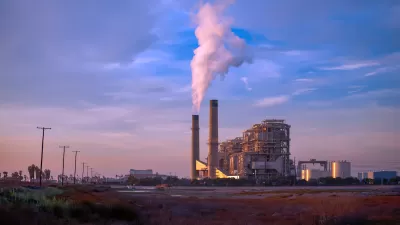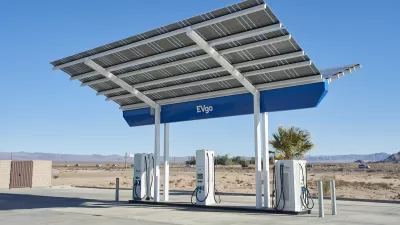On July 22, the congressional attempt to pass comprehensive climate change legislation officially ended for the year. That day the World Resources Institute unveiled a report assessing carbon reductions possible under existing federal and state law.
NYT 'green' blogger John Broder evaluates the WRI report in light of the Senate's failure to pass legislation. It's clear that the EPA's existing authority to regulate carbon emissions under the Clean Air Act would have to play a central role in any reduction effort, says Broder. However, the report concedes that "new legislation is needed to put a price on the emissions from dirty-burning fossil fuels, the group concluded."
"The study (warning: quite wonky) looks at federal and state laws governing greenhouse gas pollutants and asks if they can achieve the goal set by President Obama at the international climate conference in Copenhagen last December - a 17 percent reduction over 2005 levels by 2020.
The short answer from the institute is no. The longer answer is that it depends on how hard federal and state officials try."
From Washington Post editorial: Outlook chilly for a smart climate bill: A range of possibilities remain for possible Senate legislation, e.g. a renewable portfolio mandate, promotion of natural gas and efficiency. "But these are not enough to achieve the size of emissions reductions for which America must aim. The most attractive policy is putting a simple price on carbon, which would encourage private initiative to reduce emissions."
Thanks to California League of Conservation Voters
FULL STORY: After the Climate Bill Failure

Alabama: Trump Terminates Settlements for Black Communities Harmed By Raw Sewage
Trump deemed the landmark civil rights agreement “illegal DEI and environmental justice policy.”

Study: Maui’s Plan to Convert Vacation Rentals to Long-Term Housing Could Cause Nearly $1 Billion Economic Loss
The plan would reduce visitor accommodation by 25% resulting in 1,900 jobs lost.

Why Should We Subsidize Public Transportation?
Many public transit agencies face financial stress due to rising costs, declining fare revenue, and declining subsidies. Transit advocates must provide a strong business case for increasing public transit funding.

Wind Energy on the Rise Despite Federal Policy Reversal
The Trump administration is revoking federal support for renewable energy, but demand for new projects continues unabated.

Passengers Flock to Caltrain After Electrification
The new electric trains are running faster and more reliably, leading to strong ridership growth on the Bay Area rail system.

Texas Churches Rally Behind ‘Yes in God’s Back Yard’ Legislation
Religious leaders want the state to reduce zoning regulations to streamline leasing church-owned land to housing developers.
Urban Design for Planners 1: Software Tools
This six-course series explores essential urban design concepts using open source software and equips planners with the tools they need to participate fully in the urban design process.
Planning for Universal Design
Learn the tools for implementing Universal Design in planning regulations.
Caltrans
Smith Gee Studio
Institute for Housing and Urban Development Studies (IHS)
City of Grandview
Harvard GSD Executive Education
Toledo-Lucas County Plan Commissions
Salt Lake City
NYU Wagner Graduate School of Public Service




























